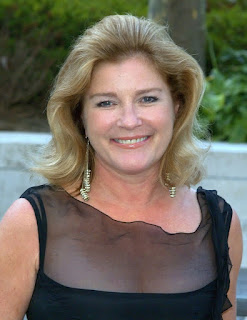 |
| Kate Mulgrew |
The title of this memoir reflects two levels of meaning. Kate Mulgrew was born in Dubuque Iowa on April 29 1955 with a full set of baby teeth. There is also the one in which she had an innate ability to develop the metaphorical teeth she would need in order to reach stardom in the cutthroat ambiance of the stage and screen spheres.
Although perhaps best-known for her seven-year role as Captain Kathryn Janeway on the long-lasting series Star Trek: Voyager, this memoir is by no means an addition to the often criticized genre of tell-all show business gossip. In fact, its ending is such as to have led me to do a search for Ms. Mulgrew’s later life.
Her early years within an Irish Catholic family did not contain as many hugs and cuddles as she might have wished. Still, when at age seventeen, she was accepted into the daunting Stella Adler Conservatory of Acting, her parents did all they could to bolster her hopes of success.
Tragically, a younger sister, Tessie, who Kate had treated as her slave, in terms of errands and tasks, contracted a slow-growing brain tumor. Sedated by morphine for two years, the family were forced to observe her gradual but definite deterioration. Still, despite Tessie's plea with Kate not to leave her in order to begin drama training, it was tacitly understood between these two sisters that Kate would be adventuring for both herself and Tessie.
Given that a large amount of successful acting entails reliving previous pain, Tessie’s illness and death doubtless came back to Kate when she needed to evoke a deep source of sorrow.
As with any young woman viewed as attractive and talented, Kate received a good deal of male adulation. Still, while acknowledging this with some natural joy, she also allows us, as readers, to see the absolute nakedness of her soul in despair. Having become pregnant in a relationship where marriage was not an option, with profound reluctance, she offered her unborn child for adoption, via a supposedly Christian organization.
After the birth, Kate persuaded a compassionate nurse to circumvent strict hospital rules by permitting her one small glimpse of her infant daughter. Brief as it was, this moment became infused into Kate’s waiting wellspring of love. Hence, interwoven throughout this memoir is her guilt and search for some information regarding this child. Her anguish became compounded when she learned, nearly twenty years later, the charity’s deceit as to the family to whom her baby was given.
Kate’s ability to create a credible character on an ongoing basis became clear when she played Mary Ryan in the soap opera Ryan’s Hope. A further triumph occurred when, portraying the central character in the 19th-century Norwegian playwright Henrick Ibsen drama, Hedda Gabler. Kate was told she was one of the few actresses to have truly comprehended and conveyed Hedda’s gnawing, overwhelming anguish.
The book goes on to describe further liaisons, and her disappointing marriage to Robert Egan. The two boys born of this union were not always happy with there mother’s sometimes lengthy absences. Their sense of desertion grew in 1995, when she accepted the prestigious but absorbing role of the first female captain, Kathryn Janeway, in the renowned series Star Trek: Voyager.
One of her most worthwhile points, I believe, is that a male actor’s need to be away for protracted periods is accepted as part of what daddies do. Conversely, no matter how scrupulously Kate Mulgrew screened and ensured the concern and abilities of nannies, her children frequently voiced or showed their rage, once even resorting to calling her a bad mother.
This echoed the comment of a previous colleague as to her inability to be a true mother, due to her emphasis on her career. The criticism plagued Kate, although she continued her work, returning home or bringing her children with her as often as feasible. The question of equilibrium between career and maternal duties may never be completely resolved.
My own perspective is that Kate Mulgrew made the best compromise she could between nurturing her children almost entirely by herself, and forfeiting all those years during which she had striven to establish herself as an actress.